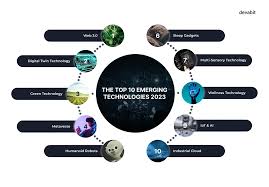Latest Trends in the World of Technology
The technology sector is constantly evolving, with new advancements and innovations emerging on a regular basis. Here is a look at some of the most significant recent developments in the world of technology.
AI and Machine Learning
Artificial Intelligence (AI) and Machine Learning (ML) continue to be at the forefront of technological innovation. Recent breakthroughs include more sophisticated natural language processing capabilities, allowing AI systems to understand and generate human language with greater accuracy. This has significant implications for industries such as customer service, where AI can now handle more complex queries.
5G Rollout
The rollout of 5G networks is accelerating globally, promising faster internet speeds and more reliable connections. This advancement is set to revolutionise industries such as healthcare, automotive, and entertainment by enabling real-time data transfer and supporting the Internet of Things (IoT). The increased bandwidth will allow for innovations like smart cities and autonomous vehicles to become more feasible.
Quantum Computing
Quantum computing has made headlines recently with several tech giants announcing progress in this field. Quantum computers have the potential to solve complex problems much faster than traditional computers. While still in its infancy, quantum computing could transform areas such as cryptography, material science, and pharmaceuticals by providing unprecedented computational power.
Sustainable Tech Solutions
As environmental concerns grow, there is an increasing focus on developing sustainable technology solutions. Innovations such as energy-efficient data centres, biodegradable electronics, and renewable energy technologies are gaining traction. Companies are investing in green tech to reduce their carbon footprint and promote sustainability.
Cybersecurity Enhancements
With cyber threats becoming more sophisticated, cybersecurity remains a top priority for businesses worldwide. Recent advancements include the development of AI-driven security systems that can detect anomalies in real time. Additionally, there is a growing emphasis on zero-trust architecture to protect sensitive data from breaches.
The Future Outlook
The pace of technological change shows no signs of slowing down. As we look towards the future, it will be exciting to see how these trends develop further and what new innovations will emerge. Staying informed about these advancements will be crucial for businesses and individuals alike as they navigate the ever-changing digital landscape.
The world of technology never ceases to amaze with its rapid advancements and potential applications across various sectors. Keeping abreast of technical news ensures that one remains prepared for what lies ahead in this dynamic field.
Exploring the Future: Key FAQs on Emerging Trends and Innovations in Technology
- What are the latest technological advancements?
- How is artificial intelligence shaping the future of technology?
- What impact does 5G have on various industries?
- Can you explain quantum computing in simple terms?
- What are some sustainable technology solutions being developed?
- How can businesses enhance their cybersecurity measures?
- Which tech companies are leading in innovation currently?
- What trends can we expect to see in the tech industry in the near future?
What are the latest technological advancements?
The latest technological advancements encompass a wide range of innovations across various fields. In recent months, significant progress has been made in artificial intelligence, particularly in natural language processing and machine learning, enabling more sophisticated interactions between humans and machines. The rollout of 5G technology is transforming connectivity by providing faster internet speeds and enhancing the potential of the Internet of Things (IoT). Quantum computing is also making strides, with breakthroughs that promise to revolutionise industries with unparalleled computational power. Additionally, there is a strong focus on sustainable technologies, such as renewable energy solutions and energy-efficient devices, driven by the global push towards environmental responsibility. Cybersecurity advancements are also noteworthy, as new AI-driven security measures are developed to combat increasingly sophisticated cyber threats. These advancements reflect the dynamic nature of technology and its profound impact on everyday life and industry.
How is artificial intelligence shaping the future of technology?
Artificial intelligence (AI) is profoundly shaping the future of technology by driving innovation across numerous sectors. AI’s ability to process vast amounts of data and learn from it enables the development of smarter, more efficient systems. In healthcare, AI is revolutionising diagnostics and personalised medicine, while in transportation, it underpins the advancement of autonomous vehicles. The integration of AI into everyday devices enhances user experiences through personal assistants and smart home technologies. Moreover, AI’s role in cybersecurity is becoming increasingly vital, as it helps detect and mitigate threats in real time. As AI continues to evolve, it will likely lead to even more transformative changes, making technology more intuitive and responsive to human needs.
What impact does 5G have on various industries?
The widespread adoption of 5G technology is poised to revolutionise various industries by offering faster data speeds, lower latency, and increased network capacity. In the healthcare sector, 5G enables real-time remote patient monitoring, telemedicine services, and enhanced surgical procedures through augmented reality. The automotive industry benefits from improved vehicle-to-vehicle communication for safer autonomous driving capabilities. In entertainment, 5G facilitates seamless streaming of high-quality content and immersive virtual reality experiences. Moreover, smart cities leverage 5G to enhance public services like transportation systems and energy management. Overall, the impact of 5G on industries is profound, paving the way for unprecedented innovation and efficiency across diverse sectors.
Can you explain quantum computing in simple terms?
Quantum computing is a cutting-edge technology that harnesses the principles of quantum mechanics to perform complex calculations at an incredibly fast pace. Unlike traditional computers that use bits to represent information as either 0 or 1, quantum computers use quantum bits or qubits, which can exist in multiple states simultaneously due to a phenomenon called superposition. This allows quantum computers to process vast amounts of data and solve intricate problems that would be practically impossible for classical computers. In simple terms, quantum computing has the potential to revolutionise the way we approach computational tasks by offering unprecedented speed and efficiency in processing information.
What are some sustainable technology solutions being developed?
In response to the frequently asked question about sustainable technology solutions being developed, there are several innovative initiatives making significant strides in the tech industry. One notable development is the rise of energy-efficient data centres that aim to reduce carbon emissions and energy consumption. Additionally, researchers are exploring the use of biodegradable electronics, which have the potential to minimise electronic waste and environmental impact. Renewable energy technologies, such as solar panels and wind turbines, continue to be refined to provide clean and sustainable power sources for a variety of applications. These advancements in sustainable tech solutions highlight the industry’s commitment to addressing environmental challenges and promoting a greener future through technological innovation.
How can businesses enhance their cybersecurity measures?
In the realm of technical news, a frequently asked question revolves around how businesses can enhance their cybersecurity measures to safeguard against evolving cyber threats. Businesses can bolster their cybersecurity by implementing a multi-layered approach that includes robust encryption protocols, regular security audits, employee training on best practices, and the adoption of advanced security technologies such as AI-driven threat detection systems. Additionally, establishing a culture of vigilance and proactive monitoring of network activity can help organisations detect and respond to potential security breaches swiftly. By prioritising cybersecurity measures and staying abreast of the latest trends in cyber defence, businesses can better protect their valuable data and maintain the trust of their customers in an increasingly digital world.
Which tech companies are leading in innovation currently?
In the fast-paced world of technology, several tech companies stand out as leaders in innovation. Companies such as Apple, known for its cutting-edge products and design aesthetics, continue to push boundaries with each new release. Google, with its focus on artificial intelligence and machine learning, remains at the forefront of developing innovative solutions for various industries. Amazon’s relentless pursuit of disruptive technologies, particularly in e-commerce and cloud computing, cements its position as a key player in driving technological advancements. Additionally, companies like Tesla, renowned for its advancements in electric vehicles and renewable energy solutions, are shaping the future of transportation and sustainability. These tech giants exemplify innovation through their groundbreaking products and services that have a profound impact on how we live and work in the digital age.
What trends can we expect to see in the tech industry in the near future?
In the rapidly evolving tech industry, several trends are poised to shape the near future. One prominent trend is the continued integration of artificial intelligence and machine learning into various applications, enhancing automation and decision-making processes. The expansion of 5G networks is expected to revolutionise connectivity, enabling faster data transfer speeds and unlocking new possibilities for IoT devices. Quantum computing is also on the horizon, promising breakthroughs in computational power that could transform industries. Additionally, a growing emphasis on sustainable technology solutions and heightened cybersecurity measures are likely to play significant roles in shaping the tech landscape in the coming years. Stay tuned as these trends unfold and redefine the technological landscape.




